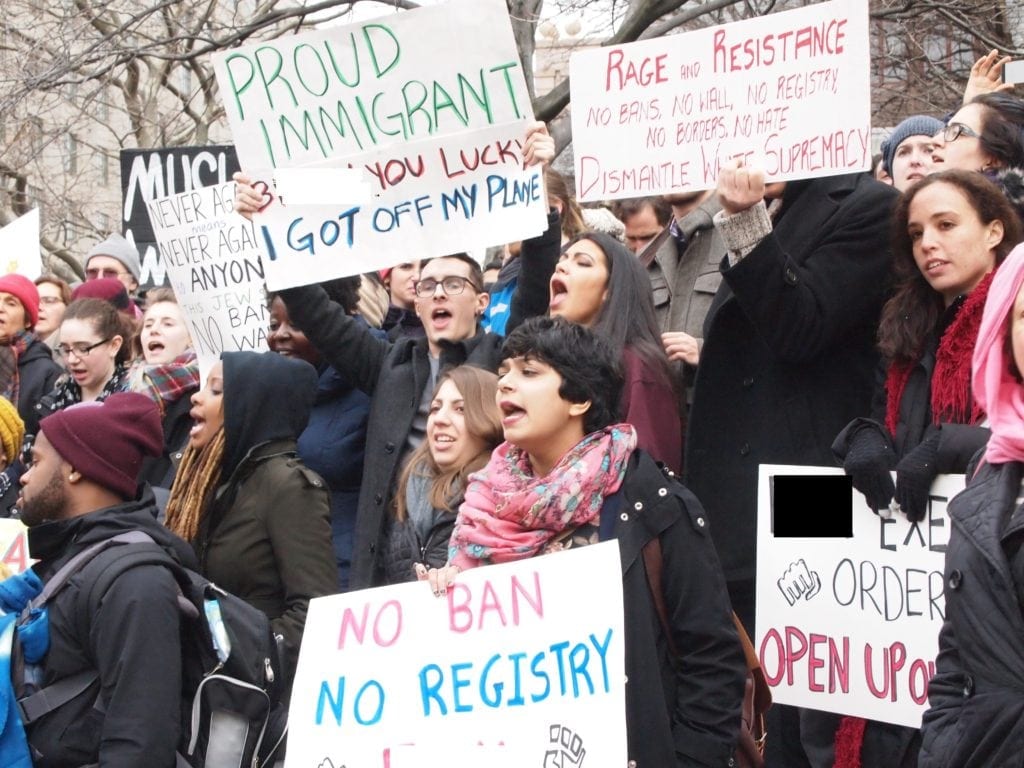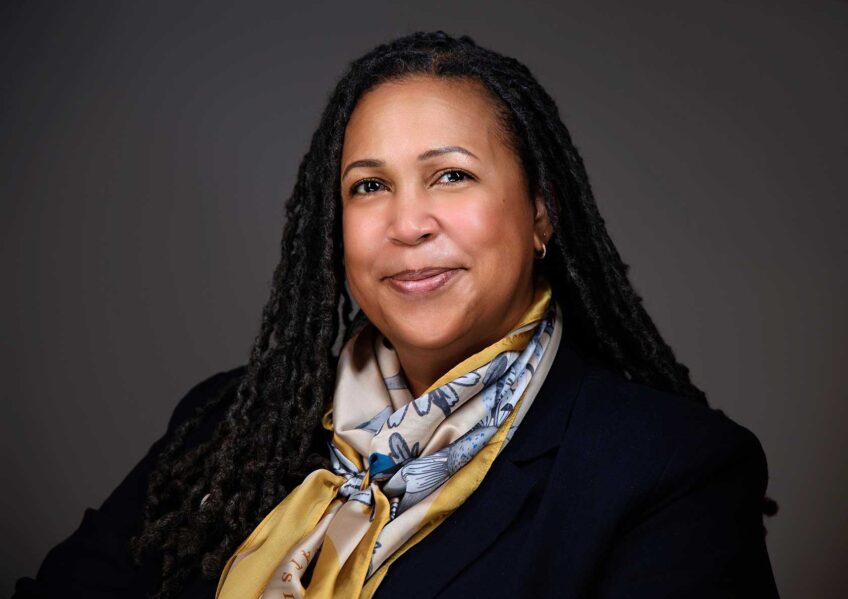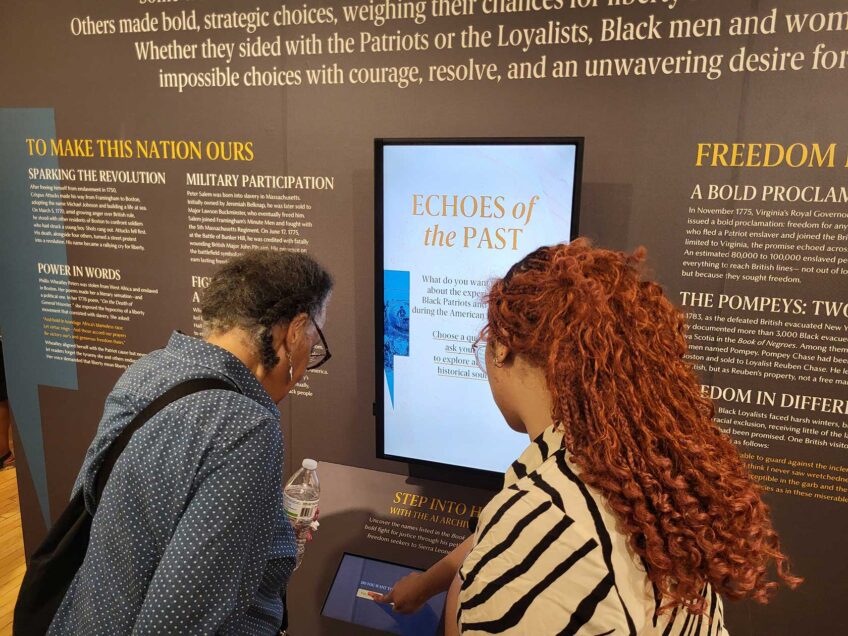
Last Friday, President Donald Trump issued a sweeping executive order to temporarily suspend the nation’s refugee program and bar refugees and immigrants from seven predominantly Muslim countries from entering the country. Boston quickly rose to answer. Over the weekend, protesters turned out to decry the immigration order, which would return refugees to danger and detain green card and visa holders, leaving them waiting to learn if their lives in America would be unraveled.
The immigration order triggered protests and court cases across the country. Thousands of demonstrators filled Copley Square Sunday afternoon in solidarity with immigrants and Muslims. Protesters objected to a presidential administration that appears eager to demonize Muslims and Middle Eastern immigrants, and said they sought to protect human rights and their communities. Some drew parallels to Jewish refugees who were denied entry during the Holocaust. Others expressed concern about the executive order’s tone, which they considered fascist and dictatorial.

Protesters filled Copley Square plaza on Sunday to rebuke Trump’s travel ban, which blocks entry to refugees and immigrants from predominantly Muslim countries.
Adnai Mendez, who emigrated from Cuba 11 years ago, rallied with his wife and their seven-year-old son. Trump’s ban includes turning away people who already have spent years being vetted by the CIA and the U.S. government, Mendez said. Had that happened to him, the effect would have been “devastating,” he told the Banner. He said he feared as well that Trump’s attempts to silence the media mirrors the path forged by many oppressive regimes.
“It is essential we take a stand against hatred and bigotry,” said Adnai’s wife, Melanie Mendez, who teaches in an English as a second language program.
John Robbin, executive director of the Council on American Islamic Relations (CAIR), which organized the protest, said organizers expected a few thousand attendees — far fewer than the approximately 25,000 who overflowed Copley Square.
The Copley rally followed a protest at Logan Airport Saturday night — a scene reenacted at airports across the country.
Boston was the locale for several other protest actions last week as well, including a downtown rally last Thursday against Trump’s moves to enact campaign promises to construct a border wall between the U.S. and Mexico. Thursday’s demonstrators promised to keep Boston safe for immigrants and their families, and the rally drew speeches from immigrant rights and labor groups, Boston clergy, and state, city and local elected officials.
“We are not agents of ICE,” Boston police Superintendent-in-Chief William Gross told Thursday’s crowd, referring to federal Immigration and Customs Enforcement, and prompting cheers.
City Councilor Ayanna Pressley said the Women’s March of the prior weekend was not an isolated event, but the beginning of a new era. The following days seemed to prove her right.
“That was not just a march,” Pressley said. “We are ushering a new movement.”
Executive order
The immigration ban took effect immediately upon Trumps’ signing, throwing airports and government officials into turmoil. Passengers were barred from flights to the U.S., while customs and border control agents, caught unaware, tried to figure out what to do. The executive order bans all refugee admission for 120 days, Syrian refugee admission for an indefinite period of time and put a 90-day ban on travel from Iran, Iraq, Libya, Somalia, Syria, Sudan and Yemen. Immigrant residents returning from funerals, family visits, conferences and other foreign destinations were detained at airports.
Confusion abounded about whether those who already have been vetted and granted lawful residence — visa holders and green card holders — could enter the country, with different federal agencies issuing contrasting interpretations.
Trump seemed to devalue the plight of Muslim refugees and told the Christian Broadcasting Network that he intends to prioritize the admission of Christian refugees from countries that are predominately Islamic over Muslims fleeing the same places.
Threat to values, vitality
Some noted that the ban violates the First Amendment’s protection of religious freedom. It threatens the economic strength and intellectual vitality of the U.S. by stranding university students, scientists who had been performing critical research in the U.S., and many others engaged in active pursuits in the country. Also caught in the ban: Iraqi allies who provide aid, such as translation, to American troops fighting abroad and, in doing so put bother their own and their families’ lives in danger. Denying them safe entry following their service could deter others from putting themselves at risk to help the U.S. in the future, some say.
German Chancellor Angela Merkel advised Trump in a Saturday phone call that the Geneva Convention requires those who are part of it, including the U.S., to take in war refugees on humanitarian grounds.

Impact of public actions
The thousands of people who rallied over the past few days appear to be making an impact, many say.
Elena Letona, executive director of Neighbor to Neighbor, said that Trump’s action has mobilized a broad base of support, activating many who are new to political demonstration.
“I’ve been in this [immigrant rights] work for a couple of decades. Many of us have this joke that every time you go, we know just about everybody,” Letona told the Banner. “[But] we are seeing a new wave of people getting engaged.”
Rodrigo Saavedera is a volunteer organizer at COSECHA, a group focused on winning protections for undocumented immigrants. He said the Logan protest created leverage that helped lawyers win the release of the four families being detained at the airport under Trump’s ban. Announced on Facebook at 5:30 p.m. Saturday, that rally drew an estimated 1,500 people by its end at 10:30 p.m., estimated Saavedera.
“At the end, we were able to leverage to get the last family to be released,” Saavedera told the Banner. “We gave high visibility to something that was going on at Logan Airport that might not have happened if protesters weren’t there.”
The rally drew politicians, including U.S. Sen. Elizabeth Warren and Boston Mayor Martin Walsh.
Eva Millona, executive director of the Massachusetts Immigrant and Refugee Advocacy Coalition, said the public outcry has brought attention to longstanding needs to update the U.S.’s immigration system, which was established in 1952, and to the fact that this kind of slapdash executive order is an ineffective approach.
“Rash executive orders that are vague and can create this kind of chaos and tear families apart are not the answer,” Millona told the Banner. “A legislative fix, that’s the answer.”
At last Thursday’s rally, Sen. Jamie Eldridge called for passage of a bill he is co-sponsoring. The Safe Communities Act would prevent the federal government from accessing information that could be used to create a registry of Muslims or others, based on national origin, religion or other protected characteristics; requires those detained on civil immigrant violations be informed of their rights; blocks state, local and campus police from taking immigration enforcment activities based solely on immigration status; and prohibits agreements that would allow the Department of Homeland Security to deputize local officers as immigration agents.
Letona said the mass mobilization against Trump’s order creates a rare opportunity for state-level reform.
“In the state of Massachusetts we haven’t been able to pass any pro-immigrant legislation in the past 15 years or more, but now we are seeing an opportunity to finally get something enacted at the state level,” she told the Banner.
Lawyers and courts act
Last week, a flurry of legal action unfolded. Saturday, the ACLU filed a lawsuit on behalf of two Iraqi visa holders, who were detained at New York’s JFK airport. In response to an ACLU request, a federal judge granted a temporary, nationwide injunction preventing deportation of those stranded at U.S. airports due to Trump’s order.
Hours later, federal judges in Boston issued a seven-day restraining order against the ban. The judge’s order stated that lawful permanent residents and immigrants with visas cannot be deported or detained by federal authorities. It also requires customs and border officials to inform flyers into Logan that they will not be detained or deported underTrump’s order.
Monday night, Trump fired Sally Yates, federal acting attorney general, for refusing to defend his executive order against legal challenges. She said the order may be illegal. Her interim replacement reversed that stance.
On Tuesday, Attorney General Maura Healey announced Massachusetts will join a lawsuit against the ban.

People power
CAIR’s Robbins said the public actions make the people’s voice heard and have prompted Trump to respond to dissenters.
“It puts pressure on the administration and lets them know that the public is not happy about the Muslim ban,” Robbins told the Banner.
Locally, there was an outpouring of positive response to the Copley rally from the Muslim community, Robbins said.
“We received so many calls and emails from Muslims that say, ‘I never knew I had so many people who supported me,’” he said. “And from people across the demographics of Massachusetts that say, ‘I’m so proud to come out and see so many of my fellow Bostonians and fellow new Englanders standing up in a strong way.”
“People don’t just talk in Massachusetts,” Millona said. “People organize. People stand up. People speak up. People march.”






